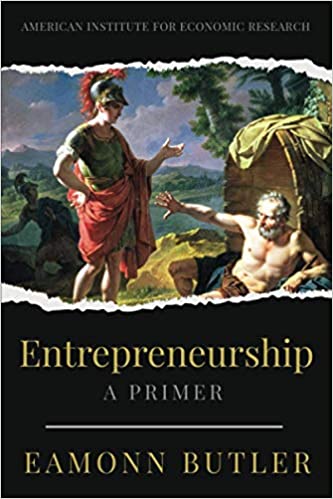Entrepreneurship: A Fading Virtue

Ever since the dawn of humanity people have pondered how to best organize themselves to progress society. Should we listen to the wisdom of village elders? Should we pay tribute to the gods and hope they will bless society with good fortune? Perhaps we should listen to experts with decades of experience who can centrally plan society with graphs, equations, and theories. These are of course all the models that have been relegated to the ashbin of history and replaced by something far more productive and inclusive. Individual liberty, markets, and mutual exchange. Free people competing and cooperating in countless different ways to introduce new ideas and products have rapidly progressed society faster than any other system ever conceived. The key operating unit of this system is not village elders, or the church, or a central planner, but the entrepreneurs. That is, individuals acting in ingenious and self-serving ways to meet the needs of society whether that be through innovation, production, or service.
This radical understanding of why and how entrepreneurs form the foundation of modern society is the basis of Eamonn Butler’s book Entrepreneurship: A Primer. Although the name of the book may suggest that it is some sort of how-to business manual, it is an essential explanation of the role of entrepreneurs in society. In his book, he reminds us that progress and prosperity come from the bottom up, not the top down. No civilization ever taxed and planned its way to greatness. The exact opposite is true. It is because of free and ambitious individuals inventing, selling, improving, hiring, and so on, in countless daily interactions that have produced the wonders of modern civilization. It is how society progresses in a manner that serves the most people possible, and not just the vision of a central authority.
The self-interested and entrepreneurial individual is an essential unit of analysis, but has been increasingly neglected by mainstream economic and political analysis. Such a disturbing trend not only gives way to authoritarian impulses but also economic stagnation and ultimately civilizational decay.
Understanding Entrepreneurship in Context
The phrase entrepreneurship can often invoke imagery of a scrappy self-employed individual or a young startup. Although these are certainly great cases of entrepreneurship, this definition is problematic because it fails to encompass the wide variety of entrepreneurs who exist in society and the endless roles they fill. Butler writes,
“A lot of bad public policy stems from confusing entrepreneurship with start-ups or self-employment. A slightly better indicator might be the number of gazelles (young fast, growing enterprises with a large turnover and a record of revenue growth) or even unicorns (privately held start-ups valued at over $1 billion)…Nevertheless, these measures focus only on the few successes that emerge from the entrepreneurial process. They massively understate the scale of entrepreneurship because they ignore the volume of entrepreneurial activity that occurs in established firms and also the vast bulk of entrepreneurial effort that ends in failure, as most do.”
Entrepreneurship comes in all shapes and sizes, whether it be an innovative startup with a completely new idea or an established company like a bank adopting blockchain technology. Enterprising and innovative activity happens everywhere on all levels when people are free to do so. Oftentimes policymakers and intellectuals make the mistake of romanticizing entrepreneurs as merely small self-employed actors, which then taints their efforts to promote entrepreneurial activity. Such innovative actors exist across all levels of society. Butler notes,
“Some of the poorest countries have high levels of self-employment, but that indicates only the prevalence of subsistence farming or home-based craft trades – not entrepreneurship. As if to underline that fact, statistics show that the more self-employed people a country has, the fewer billionaires it boasts.”
This clarification is especially important today as large corporations are often targeted to be broken up with antitrust litigation, in some part to promote innovation and entrepreneurial activity. This conception of entrepreneurship as only a product of small-scale enterprises sorely misses the fact that innovative activity occurs across many different scales. Frequently working with a large company with superior pools of capital and resources may be more beneficial to entrepreneurial activity than working with a smaller one. Oftentimes it is impossible to make objective judgments on what is the optimal environment for entrepreneurship as the process itself is so chaotic and dynamic that it is hopeless for a central entity to even begin to make comprehensive judgments when it comes to supporting entrepreneurship. The best thing policymakers can do with this in mind is to get out of the way.
This is the inspiration for the painting on the cover of the book, which is a famous scene depicting a conversation between Alexander the Great and the Greek philosopher Diogenes who lived in a barrel. Alexander asks the philosopher what he can offer him given his vast armies and wealth. Diogenes simply asks Alexander to step to the side because he was blocking the sun.
A similar approach should be adopted by the government when it comes to supporting entrepreneurial activity. Just stay out of the way and let the process work. If politicians understood how to run an innovative company or create new products, they would likely be doing that instead of being politicians.
The State Cannot Create Entrepreneurship
It is easy to understand that innovative and dynamic private enterprise is a good thing. Therefore, recent efforts by governments across the world to promote entrepreneurship through public investment and guidance are understandable, but unfortunately misguided. The problem is that once the government tries to get thoroughly involved in private enterprise, it’s not really private enterprise anymore. Entrepreneurial activity is spontaneous, decentralized, and dynamic, which is why it flourishes when the government gets out the way by reducing regulations and tax burdens. However, Butler explains that many governments have wrongly tried to steer such activity unilaterally, which often just results in wasted tax money. He writes
“Promoting economic enterprise is not the core business of government, nor even an endeavor that it is either good or competent at. Other countries such as France have tried to reproduce Silicon Valley and create their own technology cluster; but like that attempt, the usual result is a large expenditure of taxpayers’ money for no obvious gain. Private venture capitalists scrutinize and assess the prospects of start-up companies every day, have the experience and know-how to do so, and the incentive to move quickly and get the decisions right. Civil servants, by contrast, are generally overstretched and more focused on political issues than profit.”
This is the fundamental difference that makes the private sector entrepreneurial and why the state often fails to be so. Profit motives and competition drive the search for new services that can better serve society at a frequency that is virtually impossible for the government. Furthermore, the government is a single entity whereas the private sector is an umbrella term for countless individual entities. As a single entity, the government can only perform a limited scope of services well; driving entrepreneurial activity is clearly not one of them. Commerce and innovation simply just happen as individuals in society act in self-interested and productive ways. Governments can do well by sticking to their jobs and not telling others how to do theirs.
Promoting Entrepreneurial Activity
After establishing the importance of entrepreneurship in progressing society and asserting that the state cannot independently direct such activity, Butler proceeds to outline some ideas that can foster entrepreneurship. One of the most important reforms would be embracing permissionless innovation. Today permissionless innovation is very much the opposite due to the large overbearing bureaucracies that characterize modern regulatory states. Butler writes,
“Many countries increasingly adopt the ‘precautionary principle’ that it is better to be safe than sorry. Often in response to lobby groups who are worried about, say, the effect of emissions on climate or the potential dangers of genetically modified food, governments impose ‘prior restraint’ on innovations, putting the onus on entrepreneurs to prove that their innovation is benign. That again does not encourage innovation and risk-taking.”
Government restrictions on innovation and productivity can often stop entrepreneurship in its tracks with rules, permits, and licenses that often do little to forward public safety. A better system that can prevent negative externalities while still allowing for high levels of productivity would be to rely on a ground-up legal system rather than a top-down one. Such a system would use the common law rather than the administrative state. Rather than attempting to police every market interaction with an overbearing regulatory apparatus, many of the negative side effects of entrepreneurial activity can be resolved with existing tort laws that govern harm done to individuals.
Another important policy change would be reducing the burden of taxation which can either hinder or completely derail entrepreneurs. Butler writes,
“Entrepreneurs list tax as one of the top problems they face. They are much more sensitive to tax rates than are larger firms. Indeed the Tax Foundation estimates that every 1% rise in US corporation tax leads to a 3.7% fall in the number of new company registrations; while a 10% cut in the income tax rates brings a 12% rise in new hires.”
Although not as essential as having a clear and reasonable regulatory environment, having navigable and growth-friendly tax burdens certainly play a role in encouraging entrepreneurial activity.
Finally, Butler explains that the right cultural and political environment is necessary to encourage growth. Having a strong rule of law is essential as entrepreneurs must be confident that they will not be trampled by a power-hungry politician at a moment’s notice and that their rights will be consistently respected. Furthermore, there must be a culture of openness and respect for individual dignity. A country that can be accepting of diverse ideas and people whether it be immigrants, thinkers, inventors, and so on, will inevitably be more entrepreneurial than those that aren’t. Entrepreneurs are agents of change and progress. A society that can tolerate change as long as it is done peacefully and consensually is one that can foster entrepreneurial activity. Finally, a culture that promotes entrepreneurship and frowns on stagnation and paternalism can help promote such productive activity. In countries like the United States, there is a premium placed on innovation and courage over protectionism and parochialism which, in turn, encourages more people to engage in entrepreneurial activity.
Key Takeaways
The prosperity and abundance we have today were and are built on the backs of countless entrepreneurs from lemonade sellers to corporate CEOs. They are in essence problem solvers and inventors across all walks of life, all doing their part to address issues in society, often driven by self-interest. It is entrepreneurs who form the foundation and operational unit of Austrian economics but sadly, their importance is slowly fading from mainstream economic analysis. Such a view of economics not only fails to acknowledge a basic tenet of the economy, but opens the door to a perception of society that merely views individuals as numbers and equations to be manipulated at will.











